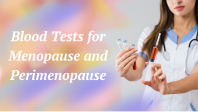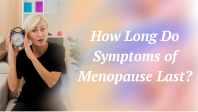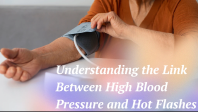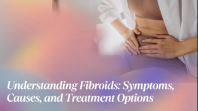How to Feel Better During Perimenopause
December 2, 2024

Perimenopause is a natural yet transformative stage in a woman’s life. Marked by physical, emotional, and hormonal changes, it serves as the transition to menopause. For many, the symptoms of perimenopause, such as hot flushes, mood swings, and brain fog, can feel overwhelming. However, with the right knowledge and tools, it’s possible to manage these symptoms effectively and improve your overall well-being during this phase.
In this comprehensive guide, we’ll explore what perimenopause is, its symptoms, and actionable steps to feel better. By incorporating evidence-based strategies, lifestyle adjustments, and dietary changes, you can take control of your health and thrive during perimenopause.
What is Perimenopause?
Perimenopause, also called the menopause transition, is the period leading up to menopause when your body undergoes hormonal changes. The word “peri” means “around” in Greek, highlighting that perimenopause surrounds the event of menopause.
During this time, your ovaries produce less estrogen and progesterone, the two primary hormones that regulate the menstrual cycle and influence various body functions. As hormone levels fluctuate, they can lead to noticeable changes and symptoms. Perimenopause typically begins in your 40s but may start as early as your 30s for some women.
Menopause officially occurs when you haven’t had a menstrual period for 12 consecutive months. The time before this, perimenopause, can last anywhere from a few months to over a decade, with an average duration of four years.
Signs and Symptoms of Perimenopause
Perimenopause affects every woman differently. Some experience mild symptoms, while others face significant disruptions to their daily lives. Below are the most common symptoms of perimenopause:
- Irregular Periods
One of the earliest signs of perimenopause is changes in your menstrual cycle. Your periods may become shorter or longer, lighter or heavier, and you may even skip a period entirely. This irregularity is caused by fluctuating estrogen and progesterone levels, which can disrupt the normal cycle.
- Hot Flushes and Night Sweats
Hot flushes, sudden sensations of intense heat that often radiate through the upper body, are a hallmark symptom of perimenopause. Night sweats, a variation that occurs during sleep, can disrupt rest and leave you feeling fatigued.
- Mood Swings and Emotional Changes
Hormonal fluctuations can lead to mood changes, irritability, and even depressive episodes. Women who are already predisposed to anxiety or depression may find these feelings amplified during perimenopause.
- Sleep Disturbances
Difficulty falling asleep, staying asleep, or waking up feeling unrefreshed is common. Night sweats and changes in progesterone, which promotes relaxation, contribute to these disruptions.
- Vaginal Dryness
Decreased estrogen levels can cause the vaginal walls to thin and produce less natural lubrication, leading to discomfort during intercourse and an increased risk of infections.
- Cognitive Changes
Brain fog, memory lapses, and difficulty concentrating are common complaints during perimenopause. These changes are linked to the decline in estrogen, a hormone that supports cognitive function.
- Weight Gain and Metabolism Changes
Many women notice weight gain, particularly around the abdomen, during perimenopause. Hormonal shifts can slow metabolism and alter how the body stores fat, increasing the risk of type 2 diabetes and heart disease.
- Bone Density Loss
Estrogen plays a vital role in maintaining bone health. As levels drop, bones may become weaker, increasing the risk of osteoporosis.
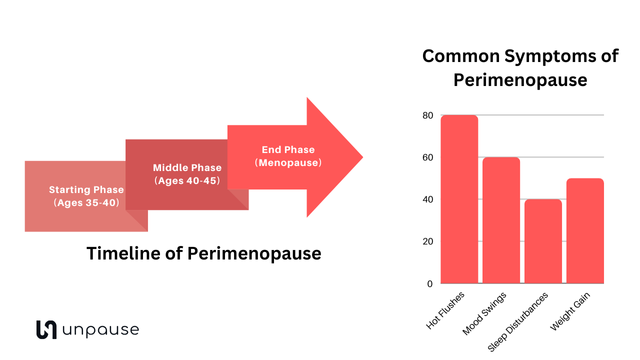
How to Feel Better During Perimenopause
While perimenopause is a natural stage, its symptoms don’t have to dominate your life. With the right strategies, you can manage symptoms and improve your quality of life.
- Embrace a Balanced Diet
- Calcium and Vitamin D: Incorporate foods like leafy greens, dairy, and fortified cereals to strengthen bones.
- Phytoestrogens: Found in soy, flaxseeds, and chickpeas, these plant-based compounds mimic estrogen and may help alleviate symptoms like hot flushes.
- Healthy Fats: Omega-3 fatty acids in fish, nuts, and seeds support heart health and may reduce inflammation.
- Whole Grains: Rich in fiber, whole grains help regulate blood sugar levels and improve digestion.
- Antioxidant-Rich Foods: Berries, spinach, and green tea combat oxidative stress and support cognitive health.
- Stay Active
Regular exercise can alleviate many perimenopausal symptoms. It helps maintain a healthy weight, reduces stress, and improves mood. Consider:
- Strength Training: Supports bone density and muscle mass.
- Cardiovascular Exercise: Boosts heart health and aids in weight management.
- Yoga and Pilates: Promote flexibility, improve balance, and reduce stress.
- Prioritize Sleep
- Create a Relaxing Bedtime Routine: Limit screen time, practice mindfulness, or read before bed.
- Maintain a Consistent Schedule: Go to bed and wake up at the same time daily.
- Adjust Your Environment: Keep your bedroom cool and dark to reduce night sweats.
- Explore Stress-Relief Techniques
- Meditation: Calms the mind and reduces anxiety.
- Deep Breathing Exercises: Help regulate your body’s stress response.
- Journaling: A tool for processing emotions and setting goals.
- Consider Hormone Replacement Therapy (HRT)
HRT involves taking synthetic estrogen and progesterone to replenish declining hormone levels. It can alleviate hot flushes, vaginal dryness, and mood swings. However, HRT isn’t suitable for everyone, so consult your doctor to weigh the benefits and risks.
- Use Vaginal Estrogen or Lubricants
For vaginal dryness, localized treatments like estrogen creams or over-the-counter lubricants can provide relief.
- Try Alternative Therapies
- Acupuncture: May help with hot flushes and stress reduction.
- Cognitive Behavioral Therapy (CBT): Effective for managing mood swings and sleep disturbances.
- Herbal Supplements: Black cohosh and red clover may ease symptoms, but consult a healthcare provider before use.
- Build a Support Network
Navigating perimenopause can be challenging, but you don’t have to do it alone. Join support groups, talk to friends, or seek counseling to process emotions and share experiences.
Resources:
https://zoe.com/learn/perimenopause-signs-symptoms-treatment

